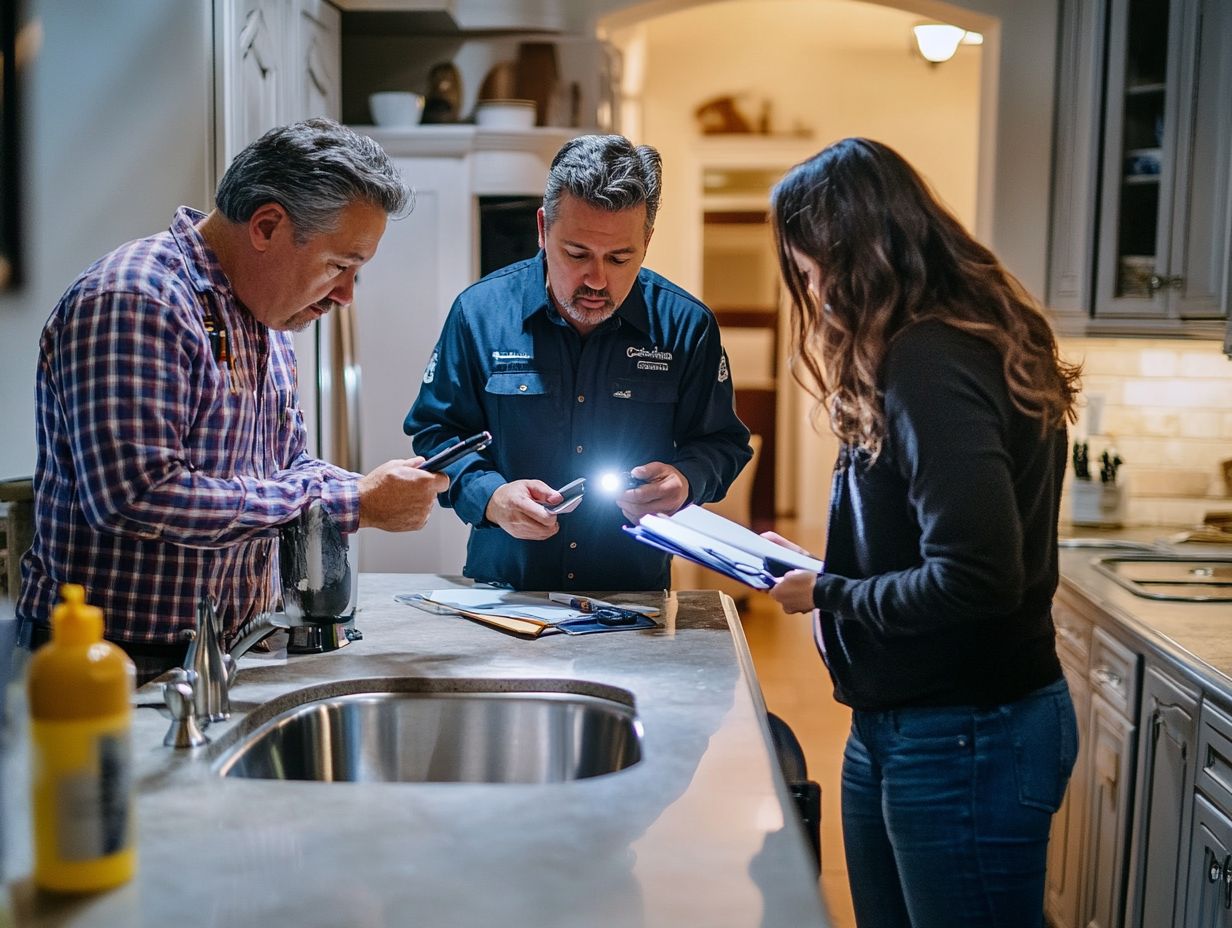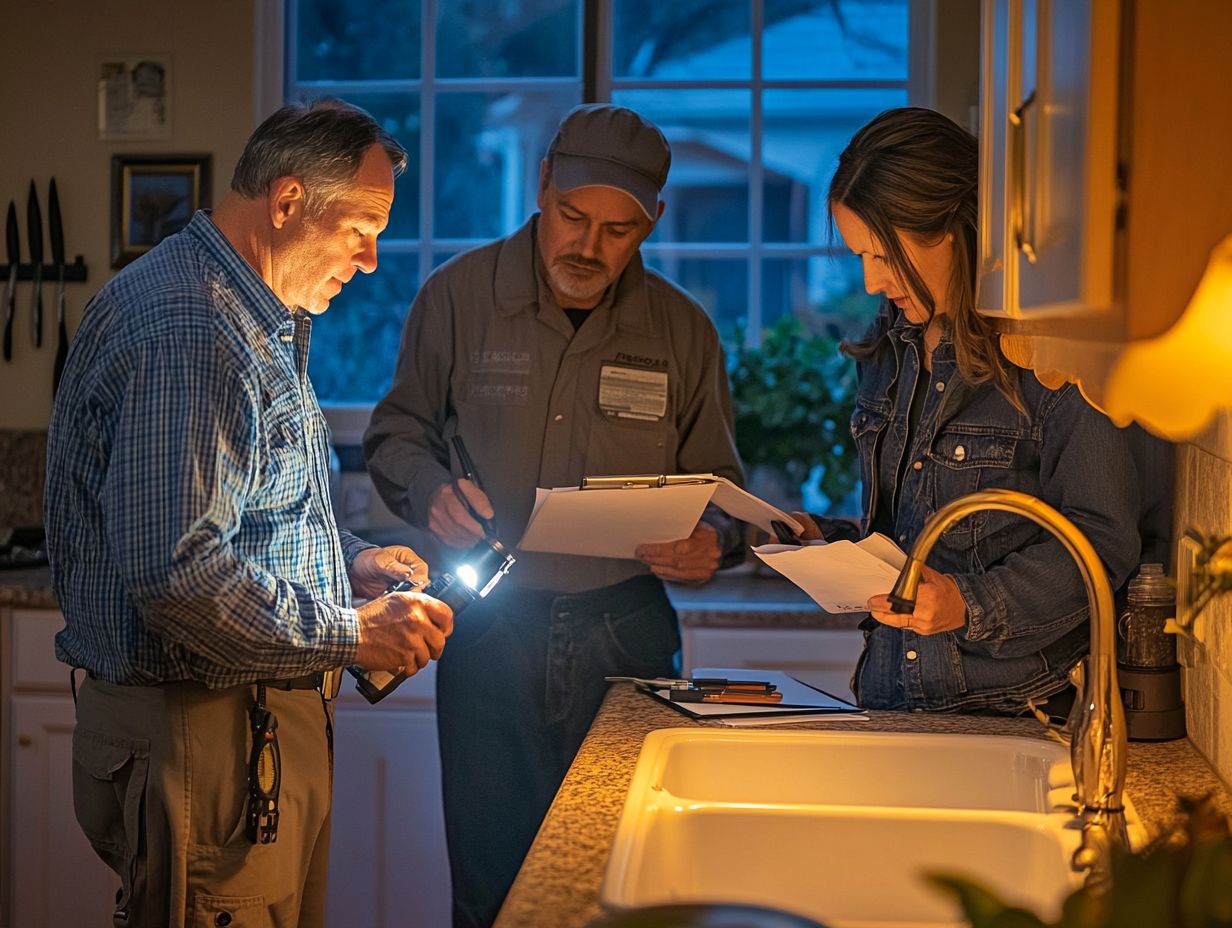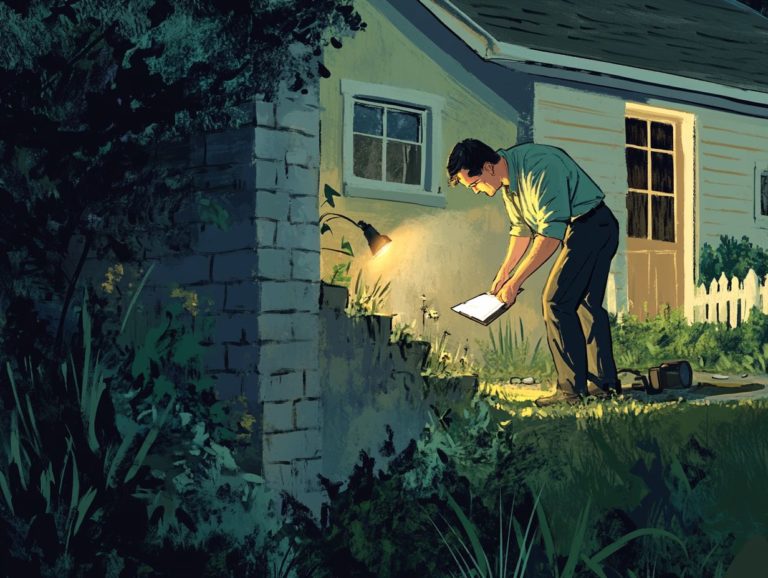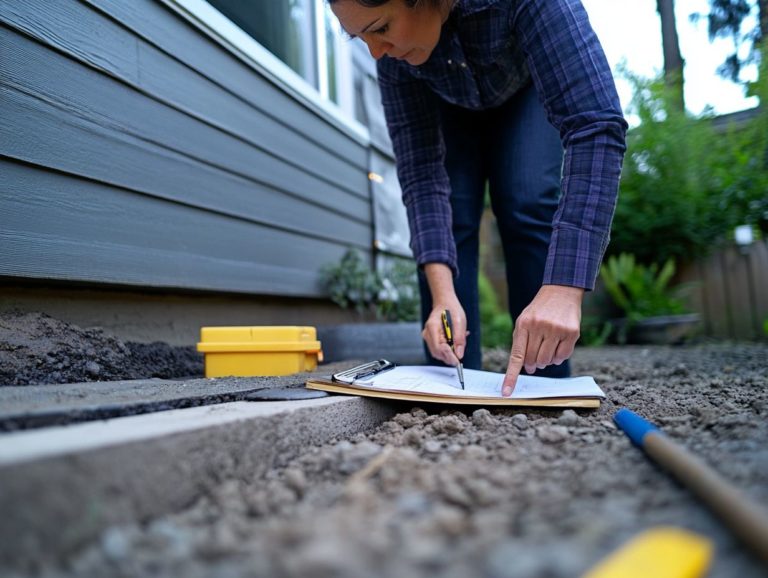The Key Role of Home Inspections in Real Estate
Buying or selling a home stands out as one of the most significant financial decisions you’ll encounter, making it essential to ensure that every detail is in pristine condition.
Home inspections are pivotal in this journey, providing peace of mind for buyers while equipping sellers for a seamless transaction.
This article delves into what home inspections entail and the advantages they offer both parties, guiding you through all the crucial aspects of this indispensable step in real estate.
Whether you re embarking on your first home purchase or navigating the selling process with experience, grasping the ins and outs of home inspections will empower you in your real estate endeavors.
Contents
Key Takeaways:

- Don’t overlook home inspections they are key to your real estate success!
- A thorough home inspection covers all major areas and systems, including the roof, foundation, plumbing, and electrical systems.
- For buyers, a home inspection can uncover potential issues and give them negotiating power, while for sellers, it prepares them for a smooth sale.
The Importance of Home Inspections in Real Estate
Home inspections play a vital role in the real estate transaction process, acting as a safeguard for both buyers and sellers. They help uncover significant issues, from structural concerns to deficiencies in the electrical system, HVAC, and plumbing, making it crucial to understand the role of home inspections in real estate transactions.
This thorough evaluation protects your interests as a home buyer and provides sellers with a detailed inspection report that can streamline negotiations, emphasizing the importance of home inspections.
By hiring a qualified home inspector certified by organizations like the American Society of Home Inspectors (ASHI), you can ensure transparency and foster trust throughout the sale process, ultimately impacting the purchase agreement and closing timeline.
Why Home Inspections are Necessary
Home inspections are vital in real estate, as they reveal issues that could influence your decision to buy. Understanding the role of home inspections in the home buying process can help you make an informed choice.
These evaluations provide insights into the property’s condition, including plumbing, electrical, and structural integrity.
When significant issues surface during the inspection, it enables you to negotiate necessary repairs or price adjustments, placing the onus on sellers to address these concerns proactively.
When sellers accept these negotiations, it cultivates an environment of trust and transparency, significantly enhancing the chances of a successful sale. Their willingness to tackle inspection findings showcases a commitment to the property, boosting your confidence as a buyer and potentially speeding up the closing process.
What Home Inspections Cover

Home inspections encompass a broad range of critical elements within a property. They assess everything from structural integrity to the functionality of essential systems, such as the electrical framework, HVAC system, and plumbing.
It s about ensuring every corner of your future home is not just aesthetically pleasing but also sound and reliable.
Areas and Systems Inspected
- The electrical system is carefully assessed for safety and functionality; outdated wiring can pose serious hazards.
- The performance of the HVAC system is checked for comfort and efficiency, impacting your energy costs.
- Plumbing issues, such as leaks or corroded pipes, can lead to expensive repairs if not caught in time.
- Structural problems are equally important, as they can jeopardize the integrity of the home.
By grasping these critical aspects, you can make informed decisions and even negotiate for repairs or adjustments before sealing the deal on your new home.
Benefits of a Home Inspection for Buyers
A home inspection offers substantial benefits for you as a buyer, revealing potential issues that may not be immediately visible.
This not only helps you make an informed decision but also strengthens your negotiating position in the real estate market.
Ready to find your dream home? Start your home inspection journey today!
Identifying Potential Issues and Negotiating Power

Home inspections provide you with the insights necessary to uncover potential issues, enabling you to leverage this information for a stronger negotiating position.
By meticulously reviewing the inspection report, you can identify specific areas requiring attention. This equips you to approach negotiations with a comprehensive understanding of the repairs needed.
If significant issues arise, you can request that the seller either complete the repairs prior to closing or offer financial concessions to cover those costs.
If the seller agrees to address the findings, ensure that the repairs are executed to your satisfaction. You might even consider a follow-up inspection to check that repairs were done properly.
If the seller disputes the findings, gather additional evidence and possibly reassess your offer, all while maintaining a firm yet diplomatic approach throughout the negotiation process.
Benefits of a Home Inspection for Sellers
Sellers, a home inspection before listing is your secret weapon for a smooth sale!
By identifying major issues upfront, you pave the way for a smoother sale process and enhance your home’s appeal to potential buyers.
This proactive step can ultimately lead to a more successful transaction, minimizing surprises and strengthening your position in negotiations.
Preparing for a Smooth Sale
Preparing for a seamless sale means conducting a thorough home inspection to uncover and address major issues before potential buyers come in for their own assessments. Understanding the role of home inspections in buyer-seller negotiations can also help you navigate this process effectively.
Once you have the inspection report in hand, take the time to review it and prioritize repairs based on what needs immediate attention and what will have the most significant impact.
Don t wait address major issues like roof leaks or plumbing problems right away to attract buyers!
Hiring professionals for evaluations or repairs not only resolves issues but also instills a sense of trust in the property s condition. Document all repairs with receipts and updates for transparency.
You might also want to consider offering home warranties or pre-inspection reports as added reassurance. This creates a more inviting atmosphere for prospective buyers and paves the way for a successful sale.
The Home Inspection Process

The home inspection process encompasses several essential steps, starting with your choice to engage a qualified home inspector and ending with a thorough review of the inspection report.
This report can wield considerable influence over your closing date, making it a pivotal moment in your home-buying journey.
What to Expect and How to Prepare
When preparing for a home inspection, it’s essential to understand the inspection process and how to effectively ready your property for the evaluator’s visit. Taking practical steps in advance can transform the experience into a smoother and more productive one.
Start by decluttering your spaces; this allows the inspector to navigate your home with ease. Ensure that access points to crucial areas like attics, basements, and electrical panels are clear.
Gather important documents, such as past repair receipts and warranties, as they can provide valuable insights for the inspector.
Recognizing that the inspection report is a vital tool for well-considered choices underscores the importance of these preparatory steps. By investing the time and effort upfront, you can significantly enhance the likelihood of a favorable outcome.
Choosing the Right Home Inspector
Choosing the right home inspector is crucial for ensuring a successful home inspection process.
Their qualifications and expertise can significantly impact the quality of the inspection report, making this decision one of the most important steps you can take.
Qualities to Look for and Questions to Ask
It’s essential to find the right home inspector! When hiring, consider specific qualities and ask targeted questions to ensure a thorough and reliable inspection report.
A knowledgeable inspector should possess not only knowledge about homes but also strong communication skills, enabling them to convey their findings clearly and accurately.
You want someone who is thorough, detail-oriented, and well-versed in various aspects of home maintenance, such as plumbing and electrical systems, as well as how well the house is built.
As a prospective buyer or seller, make sure to ask about the inspector’s qualifications, experience, and any specific certifications they hold.
Don’t hesitate to ask about their approach to the inspection and the tools they use. This can offer valuable insight into the quality of the evaluation.
By prioritizing these attributes and questions, you can significantly enhance the likelihood of a successful transaction.
Frequently Asked Questions
What is the key role of home inspections in real estate?
The key role of home inspections in real estate is to provide valuable information and insight about the physical condition of a property. This helps buyers make informed decisions and negotiate fair prices while also protecting sellers from potential legal issues.
Who typically pays for a home inspection?
In most cases, the buyer is responsible for paying for the home inspection. However, some sellers may choose to have a pre-listing inspection done to identify any issues beforehand and potentially save time during the selling process.
What areas of a home are typically inspected?
A comprehensive home inspection will cover the main components of a property, including the roof, foundation, electrical system, plumbing, HVAC, and overall structural integrity. Other areas that may be inspected include the exterior, interior, and additional features like pools or sprinkler systems.
How long does a home inspection usually take?
The duration of a home inspection can vary depending on the size and condition of the property. On average, a thorough inspection can take anywhere from 2 to 4 hours. However, larger or more complex homes may require more time.
Can a home inspection affect the sale of a property?
Yes, a home inspection can have a significant impact on the sale of a property. If the inspection reveals major issues or safety hazards, the buyer may choose to renegotiate the price or back out of the sale altogether. On the other hand, if the inspection is clean, it can provide buyers with peace of mind and potentially lead to a smoother transaction. Understanding the value of home inspections for real estate agents can further enhance this process.
Are there any potential drawbacks to a home inspection?
While home inspections are generally beneficial, there can be some drawbacks. For example, if the inspector finds significant issues, it could cause delays or even cancel the sale. Home inspections are not foolproof and may not uncover all problems with a property.
Don t wait! Get your home inspected today to ensure a smooth transaction!






